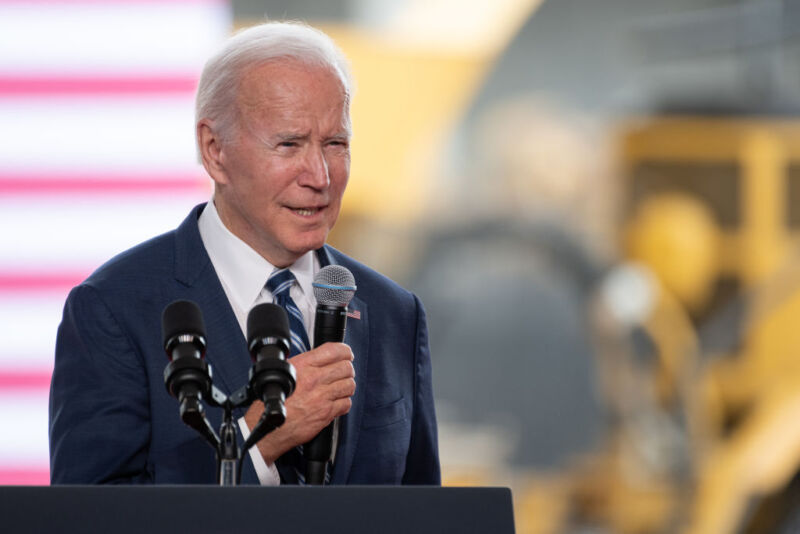
President Joe Biden’s plan to expand America’s command of the global chips market hit another setback Thursday when Taiwan Semiconductor Manufacturing Company (TSMC) Chairman Mark Liu announced that he anticipates significant delays at the company’s second chips plant in Arizona.
This news follows previous delays announced last year at TSMC’s first chips plant, which Liu partly blamed on US workers lacking specialized skills. At Thursday’s news conference, Liu “reiterated” those complaints, Bloomberg reported, claiming that TSMC is still struggling to hire skilled workers in Arizona.
According to Liu, TSMC’s second Arizona plant—which is supposed to become the most advanced facility in the US—likely won’t start volume production of advanced chips until 2027 or 2028. That’s potentially two years longer than initial projections suggesting that production would start in 2026.
Such lengthy delays, Bloomberg noted, might be “time enough for semiconductor tech to advance by one generation.” If that’s the case, one of the country’s biggest foreign investments ever might result in the US still lagging behind foreign chips competitors.
Liu also suggested that the second plant, even with delays, might not start producing the 3-nanometer chip that TSMC had earlier stated would be possible in 2026. This 3-nm chip is “among the most advanced” chips manufactured today, The Wall Street Journal noted, but Liu said that until TSMC could calculate “customer demand and government incentives,” the chipmaker wouldn’t be able to determine “the specific chip type” that the second plant would begin producing as late as 2028.
TSMC’s delays could be due to a lack of Chips Act funding, Bloomberg suggested, pointing out that none of the leading chip manufacturers ramping up efforts in the US today have been approved for funding yet by the Department of Commerce.
Last month, Commerce Secretary Gina Raimondo confirmed that the US had not yet awarded grants to commercial semiconductor facilities like TSMC because selecting a defense contractor first “was meant to emphasize the administration’s focus on national security,” The New York Times reported. By funding BAE Systems, the Biden administration was likely moving quickly to decrease reliance on China-based chip supply chains for military purposes amid growing tensions between the two countries.
“When we talk about supply chain resilience, this investment is about shoring up that resilience and ensuring that the chips are delivered when our military needs them,” Jake Sullivan, President Biden’s national security adviser, said last month.
If the US announced funding for TSMC, that could ensure that the second Arizona chips plant would be operational by 2027 rather than 2028. According to Bloomberg, TSMC announced it was building a “more modest plant” in Japan that’s on track to launch operations this year after the Japanese government promptly provided funding.
In December, Raimondo promised that “much larger grants for major semiconductor manufacturing facilities run by companies like Intel, Samsung,” or TSMC would be announced “in the coming months.” She also confirmed that the “pace” of announcing awards would speed up in the first half of 2024.
Liu said that TSMC is in “consistent communication with the US government on incentive and tax credit support” in Arizona, the Journal reported.

